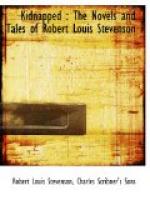It was sweet and laughable to hear Alan eat his words up in the fear of some fresh quarrel. I could have laughed, had not my stitch caught me so hard; but if I had laughed, I think I must have wept too.
“Alan,” cried I, “what makes ye so good to me? What makes ye care for such a thankless fellow?”
“’Deed, and I don’t, know” said Alan. “For just precisely what I thought I liked about ye, was that ye never quarrelled:—and now I like ye better!”
CHAPTER XXV
IN BALQUHIDDER
At the door of the first house we came to, Alan knocked, which was of no very safe enterprise in such a part of the Highlands as the Braes of Balquhidder. No great clan held rule there; it was filled and disputed by small septs, and broken remnants, and what they call “chiefless folk,” driven into the wild country about the springs of Forth and Teith by the advance of the Campbells. Here were Stewarts and Maclarens, which came to the same thing, for the Maclarens followed Alan’s chief in war, and made but one clan with Appin. Here, too, were many of that old, proscribed, nameless, red-handed clan of the Macgregors. They had always been ill-considered, and now worse than ever, having credit with no side or party in the whole country of Scotland. Their chief, Macgregor of Macgregor, was in exile; the more immediate leader of that part of them about Balquhidder, James More, Rob Roy’s eldest son, lay waiting his trial in Edinburgh Castle; they were in ill-blood with Highlander and Lowlander, with the Grahames, the Maclarens, and the Stewarts; and Alan, who took up the quarrel of any friend, however distant, was extremely wishful to avoid them.
Chance served us very well; for it was a household of Maclarens that we found, where Alan was not only welcome for his name’s sake but known by reputation. Here then I was got to bed without delay, and a doctor fetched, who found me in a sorry plight. But whether because he was a very good doctor, or I a very young, strong man, I lay bedridden for no more than a week, and before a month I was able to take the road again with a good heart.
All this time Alan would not leave me though I often pressed him, and indeed his foolhardiness in staying was a common subject of outcry with the two or three friends that were let into the secret. He hid by day in a hole of the braes under a little wood; and at night, when the coast was clear, would come into the house to visit me. I need not say if I was pleased to see him; Mrs. Maclaren, our hostess, thought nothing good enough for such a guest; and as Duncan Dhu (which was the name of our host) had a pair of pipes in his house, and was much of a lover of music, this time of my recovery was quite a festival, and we commonly turned night into day.




